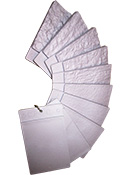The artistry of a stunning concrete floor captivates our attention, but its strength and endurance hinge on a meticulous process that often goes unnoticed. This vital process, known as surface preparation, is paramount in the floor’s creation. As defined by the International Concrete Repair Institute, surface preparation encompasses various techniques aimed at removing deteriorated or contaminated concrete while roughening and cleaning the substrate to improve the adhesion of repair materials or protective coatings.
Some common surface preparation techniques include shot-blasting, scarifying, grinding, and acid etching, which are essential for modifying the texture and roughness of the concrete surface to achieve the desired concrete surface profile. By understanding the various levels of CSP, you can effectively assess how well your floor is prepared for a coating or overlay. Achieving the correct concrete surface profile is crucial, as it significantly influences the strength of the mechanical bond between your coating and the concrete surface.
Selecting the appropriate concrete surface profile for your project may not always be specified by the manufacturer, which is where the ICRI’s 10 CSP classifications come into play, outlining their specific applications. Lower-numbered profiles provide a smoother finish, with CSP 1 being nearly flat, while higher numbers indicate a rougher surface with increased “tooth.
Choosing the right CSP by Application

CSP 1-3 is recommended for the optimal application of acrylic sealers, water-based stains, reactive acid stains, and dyes while CSP 4-6 enhances the concrete surface to establish the strongest mechanical bond for thin cement-based overlays and resinous coatings such as epoxies. For thicker applications like stampable overlays, self-leveling compounds, urethane cement, and more substantial resinous flooring, a Concrete surface profile of 5-10 may be necessary.
| Application | Mils | Desired CSP |
| Sealers | 0-3 | 1-3 |
| Thin Films | 4-10 | 1-3 |
| High-Build | 10-40 | 3-5 |
| Self-Leveling | 50-125 | 4-6 |
| Polymer Overlay | 125-250 | 5-10 |
CSP by Surface Prep Type
Choosing the right Concrete Surface Profile level is crucial for each application, whether it’s a polished floor, a coating system, or an industrial surface. Understanding CSP and its significance ensures that concrete surfaces meet the specific requirements for bonding, safety, and visual appeal, contributing to long-lasting and functional concrete structures.
Here is a guide to the different surface profile levels achieved through various surface prep techniques.
| Application | CSP |
| Detergent Scrubbing | 1 |
| Low-Pressure Water | 1 |
| Acid Etching | 1-2 |
| Grinding | 1-3 |
| Sand Blasting | 2-5 |
| Steel Shot Blasting | 3-8 |
| Scarifying | 4-9 |
| Ultra-High Pressure Water Jetting | 6-10 |
An Essential CSP Tool

The International Concrete Repair Institute offers chip sets that enhance your understanding of the surface texture associated with each of the ten Concrete Surface Profile levels. Integrating this chipset into your toolkit will not only facilitate effective training for your team but also enable your customers to recognize the superior quality of your floor preparation compared to competitors. You can purchase the set of 10 CSP chips without being an ICRI member, but ICRI members enjoy a generous 50% discount. To acquire this essential surface preparation tool, visit the ICRI website.
